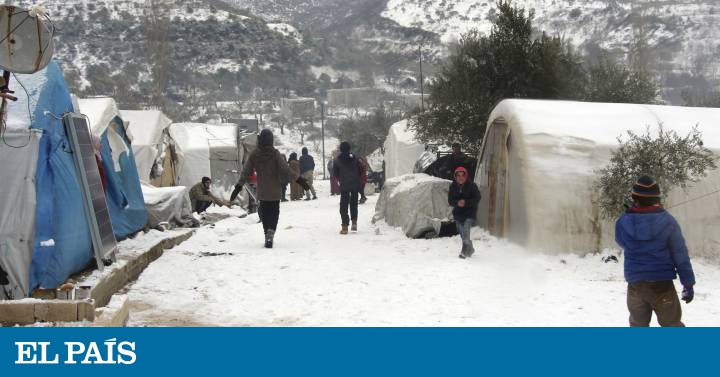"The roads are saturated with people fleeing in all types of vehicles fearing to be bombed by the regime to end up sleeping in the open at eight degrees below zero because they cannot afford a tent," summarizes an exhausted Abu Ahmed, fictional name on the phone of this worker from a local NGO in the Syrian province of Idlib, in the northwest of the country and bordering with Turkey. "Those who arrive at the border are repelled by Turkish border guards," he says.
MORE INFORMATION
- The UN warns of the greatest exodus of Syrian civilians since the beginning of the war
- Idlib, the last rebel stronghold
More than 900,000 people have fled already harassed by the bombings and about 300 have lost their lives so far this year, according to the UN. At least 36 were minors. With temperatures up to 10 degrees below zero, the Save The Children organization has warned of the “extreme conditions” to which the more than 290,000 displaced children are exposed. Of them, said the NGO on Tuesday with information from organizations in the area, nine have died in the camps for displaced "by extreme temperatures and horrible living conditions."
The youngest was called Ahmed Abdelwahab el Rahal, displaced from the village of Jan Sheikhun, who has died seven months after arriving at the Atmeh camp, about 35 kilometers north of Idlib, on the border with Turkey. "He died of cold a week ago because his father, who has two families [in reference to a polygamous man], had no money to buy fuel with which to warm the little one," explains Ali Jalfe, head of field communication.
There seems to be no escape for the people who inhabit this piece of Syria, which is the last region outside the control of the regular Army. In the province of Idlib there are now about three million people, including inhabitants of the area and fighters of insurgent or jihadist groups who, with their families, left other areas of the front of the long Syrian civil strife. For that reason, to undertake the flight again is a déjà vu for half of them.
"If there are no bombings, we will not leave Idlib," says Professor Um Fateh in a telephone conversation from the capital of this province, in the thirties and mother of three children, and twice displaced since she left her city in 2016. Natal, Aleppo. "As soon as the Army is about 20 kilometers from a town, its inhabitants run away because they know that it is the radius in which the bombings begin to pave the way," he continues. According to the UN, the bombs of Syrian and Russian fighters are responsible for 90% of civilians killed in the current fighting front in southern Aleppo, where Syrian pro-government troops try to tear the ground from jihadist factions and groups Salafist insurgents backed by more than 5,000 Turkish soldiers.
Towards the Atmeh camp, one of the most crowded in the area, 118,000 people have been directed so far this year, according to the recount made by local councils opposing Damascus. There are another 400,000 souls crowded in the last nine years have fled from other fighting. “Each store measures 16 square meters and now welcomes between two and three families. There is no place for more people, ”says Ali Jalfe.
In the biggest crisis of displaced people since the war broke out in Syria (in March 2011), according to the UN, 80% are widowed women like Um Fateh, in charge of minors. To the war, this teacher tells us that she is reluctant to leave the capital of the province, the impositions of the jihadists of Hayat Tahrir al Sham are added, especially hard in the control of women's clothing.
The rapid advances of the forces loyal to Damascus have allowed the Syrian president, Bachar el Asad, to regain control of more than 43% of the province while thousands of people flee in search of refuge from the fighting. In the chaos of war the business of human misery flourishes at the hands of Syrian traffickers and Turkish border guards who charge 2,800 euros per person to cross into Turkey - which is equivalent to two years of salary in Syria -, according to various sources consulted . Given the shortage, cross-border traffickers do business by selling displaced shops made in Turkey to Syrian displaced persons for 175 euros - two months of salary. Stores not to die of cold.








